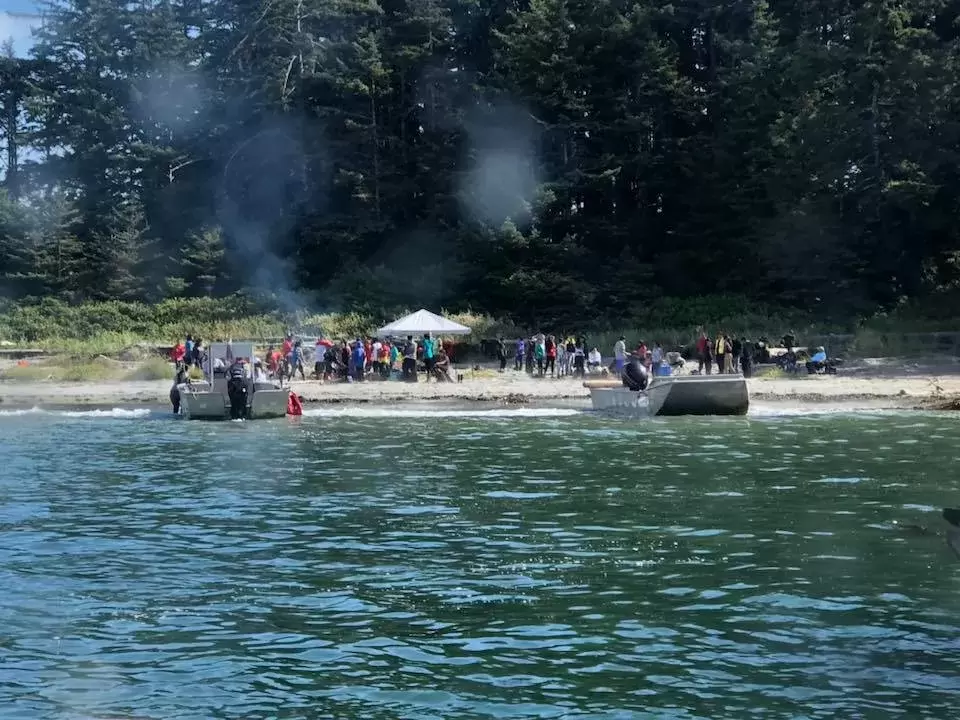Thanks to more than $200,000 in federal funding, Ahousaht First Nation will soon be able to enhance its marine safety capabilities.
The Canadian government announced Nov. 6 that it will be providing $214,156 to the Nuu-chah-nulth First Nation so it can add a search and rescue boat, as well as some required equipment, to its existing emergency services. During the announcement it was also revealed Nisga’s Nation would receive funding, more than $300,000, to also purchase a search and rescue boat and equipment.
Ahousaht’s Chief Councillor Greg Louie said construction of its new boat has actually been taking place for a few months now in Port Alberni.
“It’s being built right now,” he said. “It will be a little while yet.”
Louie is hoping the local boat will be completed by next March or April. And then it will be operational and ready for use by the local search and rescue team, which currently utilizes two of its own fishing boats as well as some other community member boats during its missions.
Louie said Ahousaht’s search and rescue team has about 10 fully trained members, who work with the Canadian Coast Guard to protect area waters.
The Canadian government has been working with Indigenous coastal communities, through its Oceans Protections Plan, to enhance marine safety and shipping so it can better protect the country’s waters.
As part of this plan, the Indigenous Community Boat Volunteer Pilot Program was launched in 2017 via the Canadian Coast Guard. The pilot program is a four-year project. Since they are members of the Canadian Coast Guard Auxiliary, Indigenous communities are provided with funds to buy boats and equipment to increase their marine safety capabilities.
Louie is pleased to see that repeated requests from his First Nation for a search and rescue boat were finally answered this year.
“Ahousaht had been advocating, on behalf of our community, and talking with the coast guard about this for a number of years,” Louie said. “We felt there was a need for it.”
Louie said the urgency for his First Nation to have a search and rescue boat became extremely evident in the fall of 2015, following the well-documented sinking of Leviathan II, a whale watching boat. Six people died in that accident near Tofino.
“A rogue wave hit the boat and flipped it over,” Louie said. “Ahousaht was first to the scene. It was our guys in their small boats. We did have talks with the coast guard back then. There was more pressure then to try and get a boat for us.”
Louie is pleased a new search and rescue boat for his First Nation will soon become a reality.
“It will be very helpful,” he said. “There’s so many people that come into the community.”
And, on occasion, some of these individuals send out distress calls while out on the water.
Louie was unable to provide an exact number of distress calls that occur yearly.
“It varies,” he said. “And it depends on the weather. Within the last month there was probably three. Most of them are late at night.”
And in order to be prepared for such calls, local search and rescue members are provided with ongoing training. In fact, a four-hour, evening training session was held in the second week of November.
“They’re keeping their skills sharp,” Louie said.
Bernadette Jordan, the Minister of Fisheries, Oceans and the Canadian Coast Guard, said Indigenous communities have played a key role as members of the Canadian Coast Guard Auxiliary as they not only protecting their own residents but mariners as well.
“Indigenous coastal communities have been stewards of the environment including oceans and shores for generations, and are unquestionably vital to Canada's marine safety system today,” she said. “The program provides necessary funding and equipment to support their efforts.”
Minister of Transport Marc Garneau said the federal government is committed to working with Indigenous coastal communities in their efforts to protect oceans and waterways. Garneau believes coastal environments and marine shipping are safer now thanks to various programs in the Oceans Protections Plan.
“Indigenous communities in their region have a significant role in implementing the Oceans Protection Plan,” Garneau said. “This additional funding will expand search and rescue capabilities for the residents of British Columbia and play a meaningful role in emergency response and waterway management.”







